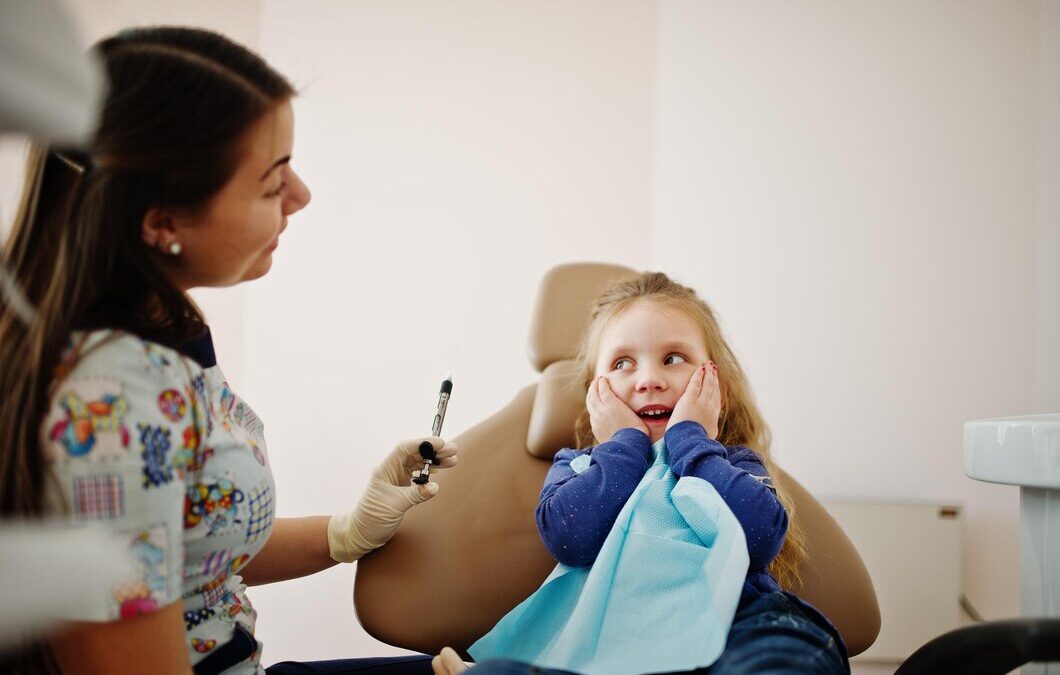Many kids are scared of going to the dentist. This fear can make dental visits a stressful experience for both parents and children. But it’s really important to help kids feel calm about visiting the dentist. This way, they can maintain good dental health early on.
Understanding why kids are afraid of the dentist is the first step. Loud noises, unfamiliar faces, and the feeling of helplessness are some reasons they feel scared. Some kids might also hear stories from friends or siblings that make them afraid.
By addressing these fears early on, we can make dental visits a positive experience. In this article, we will discuss tips and techniques to help your child overcome their fear of the dentist. This will make sure your child’s dental health stays on track and their smile stays bright.
Understanding Your Child’s Fear of the Dentist
Children often have various fears about visiting the dentist. Some common fears include the sound of the dental instruments, the fear of pain, and the worry about being separated from their parents. These instruments might look scary and make loud noises, which can be very unsettling for a child.
Possible reasons for these fears range from hearing scary stories from friends to past unpleasant experiences at the dentist. Sometimes, seeing or hearing adults express their own dental anxieties can also make children feel nervous about their own visits.
It’s important to address these fears early because ignoring them can lead to bigger problems in the future. If a child remains scared of the dentist, they might avoid going to the dentist altogether. This could result in poor oral health and more serious dental issues later on.
Practical Steps to Ease Dental Anxiety in Children
To help your child feel better about going to the dentist, try preparing them before the visit. Talk to them about what to expect in simple words they can understand. Let them know that the dentist is there to help keep their teeth healthy and strong.
Role-playing can also be a great way to reduce anxiety. Pretend to be the dentist and let your child be the patient. Use a toothbrush and a mirror to mimic a dental checkup. This helps your child get used to the idea of someone looking at their teeth.
Choosing the right time for appointments is also important. Pick a time when your child is usually calm and not tired or hungry. Morning appointments might be best for younger children because they are not yet tired from the day’s activities. Also, try to schedule appointments at times when the dental office is less busy so the environment is quieter and less overwhelming for your child.
Techniques Dentists Use to Calm Nervous Children
Dentists often use special techniques to help calm nervous children. Many dental offices have created a fun and welcoming environment to make children feel more comfortable. Bright colors, toys, and kid-friendly decorations can make the dental office seem less scary.
Sedation options are available for children who are particularly anxious. These can range from laughing gas to mild sedatives. Laughing gas is a safe and commonly used option that helps kids relax while staying awake. Your dentist will discuss the best choice for your child’s needs.
Positive reinforcement is another effective method. Dentists may use praise and small rewards to encourage good behavior. Stickers, small toys, or a fun toothbrush can make the experience more positive. This builds positive associations with dental visits, making future appointments less stressful.
How Consistent Dental Visits Build Confidence
Regular dental checkups are essential for building your child’s confidence. When dental visits become a normal part of their routine, the fear and anxiety often lessen over time. This helps them understand that visiting the dentist is just a regular part of taking care of their health.
Building a trusting relationship with the dentist is key. Seeing the same dentist regularly allows your child to become familiar with them. This trust makes your child more likely to relax and cooperate during visits. The dentist can become a friendly face rather than a stranger.
Good oral hygiene habits at home are also important. Teach your child how to brush and floss properly. Make these activities fun and part of their daily routine. When children know they are taking good care of their teeth, they are less likely to fear the dentist. They will see the dentist as a partner in keeping their smile healthy.
Conclusion
Helping your child overcome their fear of the dentist is not only possible but essential for their long-term oral health. By addressing their fears early, using practical strategies at home, and relying on the techniques dentists use, you can make dental visits a positive experience for your child. Regular checkups and good habits at home will build their confidence and help them see the dentist as a friend.
If you’re looking for a family-centered dental office that understands how to make kids feel at ease, consider New Life Dental Arts in Lake Stevens, WA. We’re dedicated to providing the best care for your child’s dental needs. Schedule an appointment today and take the first step toward a lifetime of healthy smiles.

